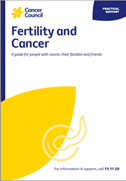- Home
- Ovarian cancer
- Managing side effects
- Menopause
Menopause
If you were still having periods (menstruating) before surgery, having your ovaries removed will mean your periods will stop. This is called menopause.
When menopause occurs naturally, it is a gradual process that usually starts between the ages of 45 and 55, but menopause after surgery is sudden.
Learn more about:
Symptoms of menopause
Symptoms of menopause can include:
- hot flushes
- dry or itchy skin
- mood swings
- trouble sleeping (insomnia)
- tiredness
- vaginal dryness.
These symptoms are usually more intense after surgery than during a natural menopause, because the body hasn’t had time to get used to the gradual decrease in hormone levels. If symptoms are causing problems for you, speak to your treatment team or doctor.
Managing the symptoms of menopause
 | Check your cholesterol levelsCholesterol levels can change after menopause, which can lead to heart disease. You can manage cholesterol levels with regular exercise and a balanced diet. Ask your doctor about cholesterol-lowering drugs. |
Use a vaginal moisturiserThis will help with vaginal discomfort and dryness. You can buy a vaginal moisturiser over the counter from chemists. | |
Learn meditation and relaxation techniquesThese may help reduce stress and lessen symptoms. | |
Ask about menopause hormone therapy (MHT)Previously called hormone replacement therapy (HRT) are benefits and risks to managing menopause with MHT. Ask your oncologist if MHT is safe for you to use after treatment for ovarian cancer. | |
Have your bone density checkedMenopause can increase your risk of developing thinning of the bones(osteoporosis). Talk to your doctor about having a bone density test or taking medicines to prevent your bones becoming weak. Regular exercise will help keep your bones strong. For more information, see Healthy Bones Australia. |
→ READ MORE: The impact of ovarian cancer on sexuality and intimacy
Video: Exercise and cancer
Podcast: Meditation and Relaxation
Listen to more of our meditation and relaxation podcasts
More resources
Dr Antonia Jones, Gynaecological Oncologist, The Royal Women’s Hospital and Mercy Hospital for Women, VIC; Dr George Au-Yeung, Medical Oncologist, Peter MacCallum Centre, VIC; Dr David Chang, Radiation Oncologist, Peter MacCallum Cancer Centre, VIC; Prof Anna DeFazio AM, Sydney West Chair of Translational Cancer Research, The University of Sydney, Director, Centre for Cancer Research, The Westmead Institute for Medical Research and Director, Sydney Cancer Partners, NSW; Ian Dennis. Consumer (Carer); A/Prof Simon Hyde, Head of Gynaecological Oncology, Mercy Hospital for Women, VIC; Carmel McCarthy, Consumer; Quintina Reyes, Clinical Nurse Consultant – Gynaecological Oncology, Westmead Hospital, NSW; Deb Roffe, 13 11 20 Consultant, Cancer Council SA.
View the Cancer Council NSW editorial policy.
View all publications or call 13 11 20 for free printed copies.

